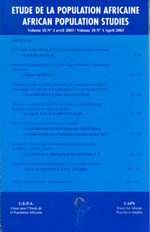
|
African Population Studies
Union for African Population Studies
ISSN: 0850-5780
Vol. 26, No. 2, 2012, pp. 256-275
|
 Bioline Code: ep12013
Bioline Code: ep12013
Full paper language: English
Document type: Research Article
Document available free of charge
|
|
|
African Population Studies, Vol. 26, No. 2, 2012, pp. 256-275
| en |
Information-field differentials and HIV/AIDS notional inclinations of mobility-differentiated population groups: clues from a Lagos study
Babatola, Olatunji
Abstract
This paper aims at filling identified perspective-cum-analytical-framework gap on sexuality-risk analysis between mobile and immobile population groups. It originated from a multi-dimensional study on itinerancy-cum-sexuality-risk study on Lagos, Nigeria, which employed stratified random sampling. It compared the subscription levels of two mobility-differentiated trader-groups to local sexuality-risk notions given their assumed theoretically-differentiated information-fields. The first analysis compared the study populations' HIV/AIDS' awareness-duration profiles, as well as their risky-sexuality-condoning notional inclinations. Thereafter, it contrasted their categorized hearsays and notions. Further analyses compute and compare their respective notional-transition scores before examining how HIV/AIDS' awareness-duration associate with current notional stances. Among other findings, the mobile group exhibit earlier access to HIV/AIDS information, but differs in the degree to which the time-awareness advantage stimulates them towards health-conducing/safe-sexuality notions. Discussion of policy-cum-research findings followed.
Keywords
Information-field; sexuality-notions; HIV/AIDS; circulators; non-circulators
|
| |
| fr |
Babatola, Olatunji
Résumé
Cet article comble une lacune identifiée dans le cadre d’analyse des littératures
disponibles sur le risque sexuel entre les populations en mouvement et celles
demeurant en place. Notre motivation provient d’une étude sur le cheminement
du risque sexuel à Lagos au Nigeria. La méthode adoptée est l’échantillonnage
aléatoire stratifié. Elle a permis de comparer les niveaux d’adhésion de deux
groupes distincts de commerçants et leur compréhension des notions de risque
sexuel vu leur supposé différence théorique des informations du terrain. Un tableau
qui dépeint la durée de l’état de sensibilisation au VIH/SIDA des populations
d’étude précède l’analyse du risque sexuel encouragé par des penchants imaginaires.
Cette analyse classifie et fait ressortir les échos et les croyances des populations
sondées. Des études approfondies exigent le calcul et la comparaison des
points imaginaires de transition. La durée de la sensibilisation contre le VIH/SIDA
n’échappera pas à notre examen. Nos résultats ont montré que la population
mobile a un accès facile aux informations sur le VIH/SIDA. Cet avantage n’est pas
pour un atout pour se protéger contre le fléau. Enfin, les résultats utiles de la recherche seront amplement discutés.
Mots Clés
information-sur-le-terrain; croyance-sexuelle; vih/sida; circulation-non circulation
|
| |
© African Population Studies
Alternative site location: http://www.uaps-uepa.org
|
|
